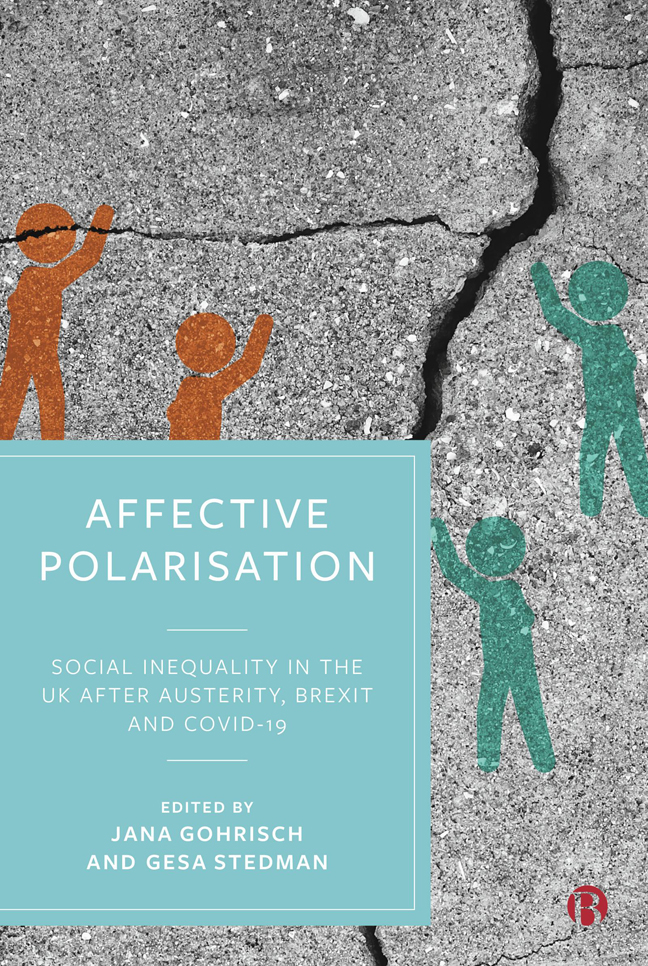Book contents
- Frontmatter
- Contents
- List of Figures, Tables and Boxes
- Notes on Contributors
- Acknowledgements
- Introduction
- 1 The Divided Left in the UK: Partisanship, Ideology and Class after Brexit
- 2 Populism and the People: Elitism, Authoritarianism and Libertarianism
- 3 ‘Coloring the Utterance with Some Kind of Perceivable Affect’: Constructing ‘Country’ and ‘People’ in Speeches by Theresa May and Boris Johnson – A Linguistic Perspective
- 4 The Challenges of Polarisation: Lessons for (Re-)Politicising Inequality across Four English Towns
- 5 “Go Away, But Don't Leave Us”: Affective Polarisation and the Precarisation of Romanian Essential Workers in the UK
- 6 Racialised Affective Polarisation in the UK
- 7 “Now You Have to Listen”: A Historical Analysis of Britain’s Left-Behind Communities
- 8 Britain in a State of Emergency: Studying Ken Loach's Films I, Daniel Blake (2016) and Sorry We Missed You (2019)
- 9 Cloaking Class: Making the Working Class Visible
- 10 Class, Poverty and Inequality in Scotland: Independence and the Creation of Affective Polarisations
- 11 Language and Identity: The Taliesin Tradition
- Conclusion
- Index
4 - The Challenges of Polarisation: Lessons for (Re-)Politicising Inequality across Four English Towns
Published online by Cambridge University Press: 23 January 2024
- Frontmatter
- Contents
- List of Figures, Tables and Boxes
- Notes on Contributors
- Acknowledgements
- Introduction
- 1 The Divided Left in the UK: Partisanship, Ideology and Class after Brexit
- 2 Populism and the People: Elitism, Authoritarianism and Libertarianism
- 3 ‘Coloring the Utterance with Some Kind of Perceivable Affect’: Constructing ‘Country’ and ‘People’ in Speeches by Theresa May and Boris Johnson – A Linguistic Perspective
- 4 The Challenges of Polarisation: Lessons for (Re-)Politicising Inequality across Four English Towns
- 5 “Go Away, But Don't Leave Us”: Affective Polarisation and the Precarisation of Romanian Essential Workers in the UK
- 6 Racialised Affective Polarisation in the UK
- 7 “Now You Have to Listen”: A Historical Analysis of Britain’s Left-Behind Communities
- 8 Britain in a State of Emergency: Studying Ken Loach's Films I, Daniel Blake (2016) and Sorry We Missed You (2019)
- 9 Cloaking Class: Making the Working Class Visible
- 10 Class, Poverty and Inequality in Scotland: Independence and the Creation of Affective Polarisations
- 11 Language and Identity: The Taliesin Tradition
- Conclusion
- Index
Summary
Introduction
It is widely known that the UK has seen a remarkable increase in inequality over the last half-century. In the late 1970s, the UK was one of the least unequal nations in the world measured by income and wealth disparities, in large part attributable to high and progressive taxation on income and inheritance (Piketty, 2014; Atkinson, 2015; Jenkins, 2016). Since the 1980s, however, income inequality in the UK has grown substantially, especially during the Thatcher years, and it has persisted at a high level since the turn of the 21st century. These inequalities are increasingly seen as driving wider processes of social and political polarisation (for example, Savage et al, 2015), manifested by growing political volatility and the outcome of the Brexit referendum. Recent analyses of these developments have considered how social polarisation takes a linked economic and geographical form, and especially how marginalised locations are peripheral to more prosperous and dynamic urban centres, including but not confined to London (see Goodwin and Heath, 2016; Hobolt, 2016; Ford and Goodwin, 2017).
This research, important though it is, runs the risk of reducing social divisions to abstract variables and their distribution across geographical space. As the Introduction to this edited collection has argued, processes of polarisation are always historically contingent and socially situated. Focusing in on the term ‘affective polarisation’, Stedman and Gohrisch suggest that existing accounts of polarisation ought to be revised in light of the fact that affect is not a simple given, but is rather ‘subject to historical change’ and can hence not be read ‘without taking issues such as power imbalances, gender, race/ethnicity, and the impact of social convention into account’. We share the authors’ emphasis on historical and social contingency but extend our analysis to include a focus on social relations between different groups (as well as how these relations might, in turn, shape and be shaped by affect). It is also for this reason that we prefer the term ‘social’ polarisation over that of ‘affective’ polarisation, though we acknowledge that the concepts are necessarily co-extensive.
In this chapter, we argue that we need to give more attention to the differing local processes which affect how social polarisation may be happening ‘on the ground’. Our chapter shows that processes of polarisation can at times override geographical variation and reveal commonalities that occur across apparently contrasting areas.
- Type
- Chapter
- Information
- Affective PolarisationSocial Inequality in the UK after Austerity, Brexit and COVID-19, pp. 78 - 109Publisher: Bristol University PressPrint publication year: 2023



